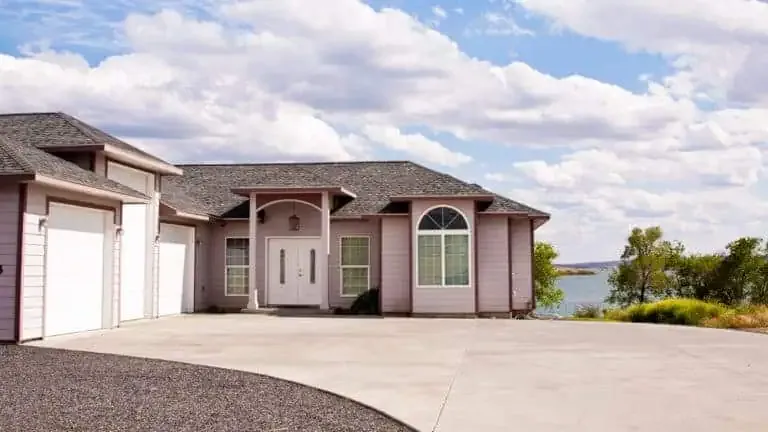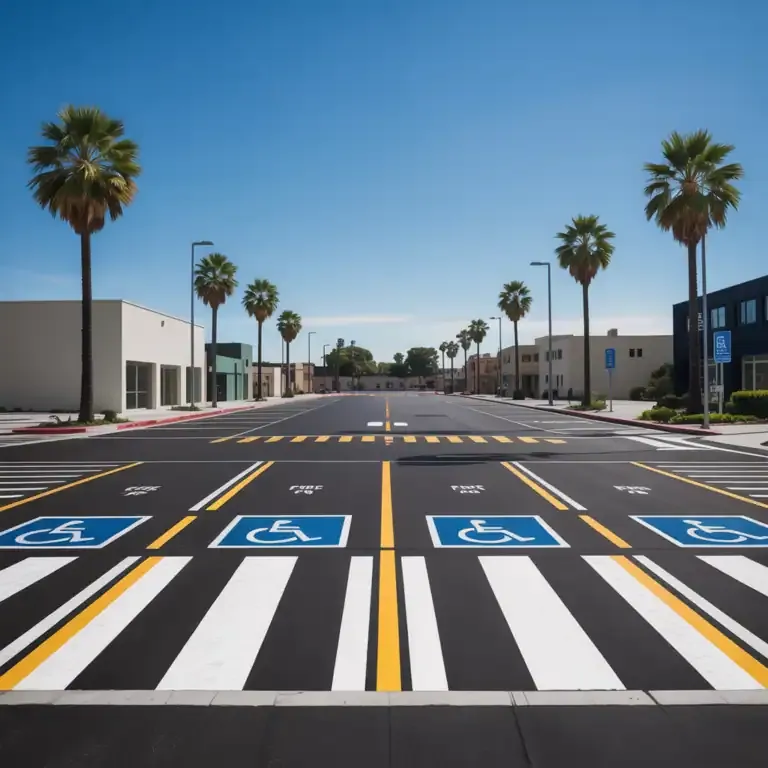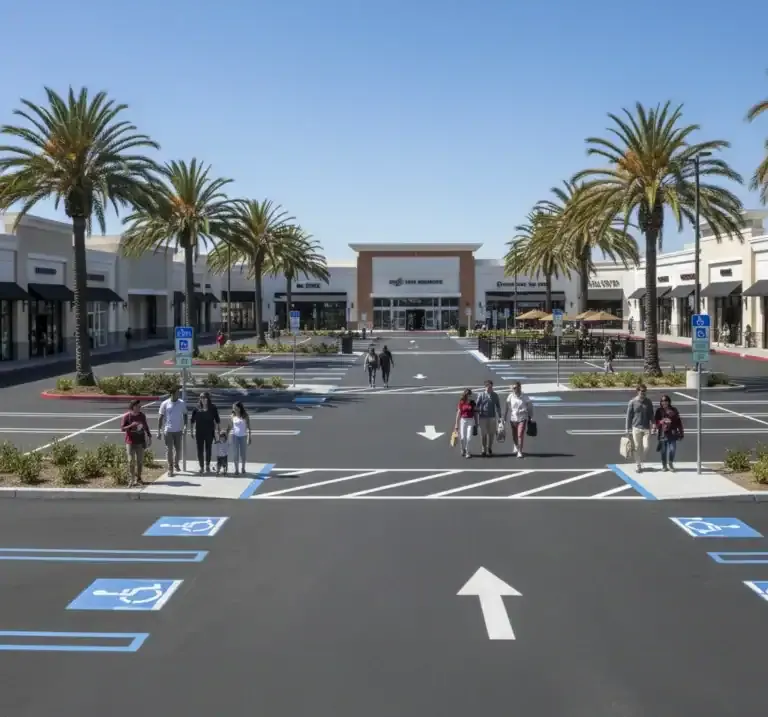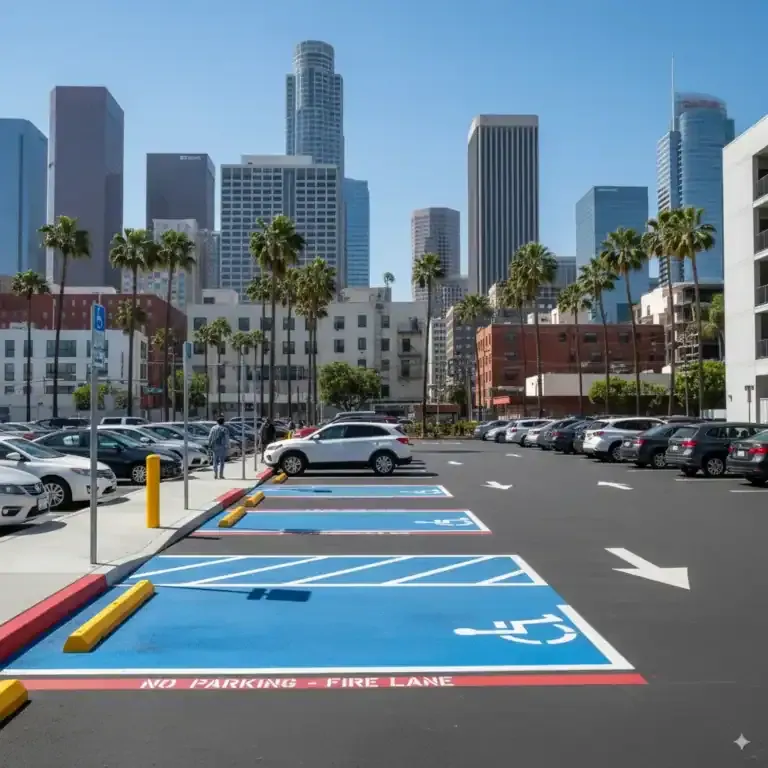Los Angeles highways handle over 7 million registered vehicles daily, making clear and durable pavement markings essential for safety and order. Faded or non-compliant striping can cause accidents, fines, or project delays, especially under California’s strict Caltrans and MUTCD standards. For commercial property managers, HOAs, schools, hospitals, and government agencies, selecting a skilled contractor for highway striping contractor Los Angeles projects ensures safety, compliance, and cost-effectiveness. This guide provides detailed steps to choose a contractor who meets Los Angeles’ unique demands, from regulatory adherence to durable materials.
By the end of this article, you’ll know how to:
- Identify contractors with proper licensing and certifications.
- Evaluate experience and material quality for lasting results.
- Ensure compliance with ADA, MUTCD, and Caltrans standards.
- Minimize traffic disruptions during striping projects.
- Prioritize long-term value over low-cost bids.
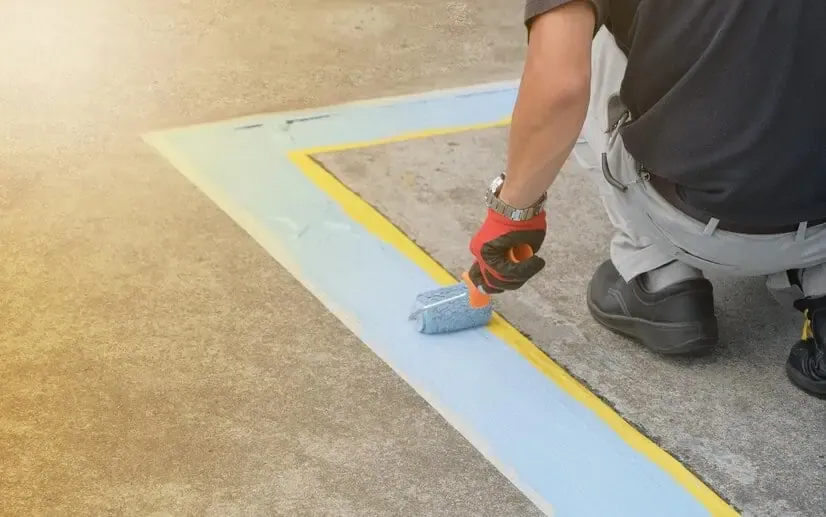
Understanding Highway Striping Needs in Los Angeles
Los Angeles highways face intense challenges. Over 3.8 billion vehicle miles are traveled annually in LA County, wearing down pavement markings quickly. The climate, with 284 sunny days and occasional heavy rains, causes standard paint to fade or crack within 1-2 years. These conditions demand durable materials and precise application to maintain visibility and safety.
Regulatory compliance is critical. The Manual on Uniform Traffic Control Devices (MUTCD) sets standards for line widths, such as 4-6 inches for lane lines, and reflectivity levels, like 100 mcd/m²/lx for white lines. Caltrans adds state-specific rules, requiring durable materials for high-traffic routes like the I-405. Non-compliance can lead to fines or project rejections. A 2023 Caltrans report noted that faded markings contributed to 12% of nighttime highway incidents in California.
Poor striping causes safety issues, such as unclear lane divisions or faded arrows, confusing drivers. A skilled contractor uses advanced materials and equipment to address these challenges, ensuring markings meet Caltrans specification compliance and withstand LA’s demanding environment.
Key Factors to Evaluate in a Highway Striping Contractor
Selecting a contractor for highway striping companies near me in Los Angeles requires careful assessment. Below are essential factors to ensure quality and reliability.
Licensing and Certifications
A contractor needs a California C-32 Parking and Highway Improvement license, verified through the California Contractors State License Board (CSLB). This license confirms they meet state standards for pavement work. Certified Access Specialist (CASp) certification is also vital for projects involving ADA compliance, such as accessible parking or pathways. CASp professionals identify compliance gaps, reducing risks of $4,000 fines per violation under California’s Unruh Civil Rights Act. Request proof of both credentials to confirm expertise.
Experience and Track Record
Experience ensures reliable results. Contractors with 40+ years in the industry have deep knowledge of Los Angeles’ traffic and environmental challenges. A portfolio with 245 highway projects or 1,167 parking lots shows versatility. Ask for before-and-after photos or case studies of government or commercial work. For example, a contractor’s freeway project portfolio should demonstrate precise lane markings and regulatory adherence.
Material Quality
Material choice impacts durability. Water-based acrylic paint lasts 1-2 years in LA’s climate, fading under UV exposure and traffic. Thermoplastic highway striping, applied at 400°F, lasts 5-7 years, resisting abrasion and weather. Epoxy paints, lasting 3-5 years, suit industrial areas. Confirm material specifications, like retroreflectivity (250 mcd/m²/lx for thermoplastic), to meet Caltrans standards. Durable materials reduce maintenance costs significantly.
Equipment and Crew Expertise
Modern equipment, like automated striping trucks, ensures precision with ±1/16-inch accuracy for 4-inch lines. Factory-trained crews handle complex materials like thermoplastic, requiring specialized skills. In Los Angeles, efficient equipment minimizes lane closure times, critical for busy highways. Ask about crew training and equipment quality to ensure consistent, safe application.
Compliance Expertise
MUTCD and Caltrans standards mandate specific line patterns, colors, and reflectivity for safety. For example, MUTCD requires yellow passing lines to be 4 inches wide with specific spacing. Caltrans demands durability for 10,000 daily vehicles on LA freeways. Contractors with expertise in these rules prevent costly rework. CASp certification ensures ADA compliance for adjacent areas, avoiding legal penalties.
The Importance of ADA and Regulatory Compliance
Compliance with ADA and California regulations is essential for Los Angeles highway projects. The Unruh Civil Rights Act imposes $4,000 fines per ADA violation, such as incorrect parking space markings. For example, a lot with five non-compliant spaces could face $20,000 in penalties, plus legal costs.
MUTCD standards specify line widths, colors, and reflectivity, like 100 mcd/m²/lx for white lines, ensuring visibility. Caltrans requires durable materials, such as thermoplastic for high-traffic routes like the I-5. A 2022 Caltrans audit found 15% of highway projects needed rework due to non-compliance, costing millions. Contractors must align markings with these standards to avoid fines or safety issues.
CASp certification sets contractors apart. These specialists conduct surveys to ensure accessible parking spaces (9 feet wide, 5-foot aisles) and pathways meet regulations. For instance, a CASp report might adjust signage heights to 60 inches minimum, preventing violations. Contractors with 1,452 CASp reports demonstrate proven expertise in accessibility.
Choosing a contractor with deep knowledge of ADA compliance Los Angeles and Caltrans standards ensures projects meet all requirements, enhancing safety and avoiding penalties. A recent Santa Ana project showed how CASp expertise ensured compliant markings without delays, benefiting a local government client.

Assessing Project Execution and Reliability
A dependable contractor for highway striping Los Angeles delivers projects efficiently, minimizing disruptions. Here’s how to evaluate their execution:
- Detailed Proposals: Written estimates should detail scope, materials, timelines, and warranties. For example, a proposal might specify thermoplastic use, 72-hour curing, and a 1-year warranty. Transparency prevents disputes and clarifies costs, like $1.00-$2.00 per linear foot for thermoplastic.
- Emergency Response: Highways need quick repairs for faded markings to maintain safety. Contractors offering 24/7 emergency services address urgent issues, such as restoring stop bars after a storm, preventing accidents on routes like the I-110.
- Traffic Coordination: Phased scheduling, like overnight striping, minimizes lane closures. Coordination with traffic authorities ensures safety with proper signage. A 2022 Irvine project completed restriping in two nights, maintaining traffic flow.
- Client Feedback: Testimonials reveal reliability. A school district might say, “The contractor’s precise markings met ADA standards without disrupting classes.” References from 197 government projects confirm consistent performance.
Reliable contractors prioritize precision, speed, and safety, ensuring your project meets deadlines and standards. Learn more about compliance solutions for highway striping to streamline your planning.
Cost Considerations and Long-Term Value
Cost is a key factor, but low bids can lead to higher expenses. Understanding costs and value ensures a smart investment in highway striping services Los Angeles.
- Cost Breakdown: Water-based paint costs $0.15-$0.30 per linear foot, lasting 1-2 years. Thermoplastic, at $1.00-$2.00 per foot, lasts 5-7 years. A 1,000-foot highway section might cost $1,500-$3,000 for paint or $8,000-$12,000 for thermoplastic. Additional costs include surface preparation ($500-$2,000) and ADA markings ($200-$500 per space).
- Avoiding Low-Bid Risks: Low bids often use inferior materials, leading to rework. A 2021 study found 20% of low-bid projects failed within two years, doubling costs. Quality contractors use durable materials, reducing maintenance frequency.
- Long-Term Savings: Thermoplastic’s 6-year lifespan costs $1,667 annually for a $10,000 project, versus $1,500 yearly for paint. Annual inspections extend marking life by 20%. Bundled services save 10-15% by streamlining coordination.
- Compliance Value: Compliant markings avoid $4,000 ADA fines. A hospital client saved $15,000 over five years with durable, compliant striping. Quality investments ensure safety and cost savings.
Why Local Expertise Matters
Local contractors in Los Angeles offer unique advantages for highway striping projects Los Angeles:
- Regulatory Knowledge: Familiarity with Los Angeles Municipal Code and Caltrans ensures compliance. For example, Caltrans requires 250 mcd/m²/lx for yellow lines, a detail local contractors understand.
- Climate Adaptation: LA’s 284 sunny days and occasional rains demand UV-resistant materials like thermoplastic. A 2020 study showed thermoplastic lasted three times longer than paint in high-UV areas.
- Rapid Response: Proximity enables quick repairs, critical for emergencies on routes like the I-10. A local contractor can respond within hours, minimizing risks.
- Traffic Insight: Knowledge of LA’s traffic patterns, like 250,000 daily vehicles on the 405 Freeway, informs efficient scheduling. Overnight work reduces disruptions by 80%, as seen in a Santa Ana project.
Local expertise ensures tailored, compliant, and efficient striping solutions.
Common Challenges and Solutions in Highway Striping
Highway striping in Los Angeles faces unique challenges. Here are solutions to ensure success:
- Premature Fading: Heavy traffic and UV exposure fade paint quickly. Thermoplastic, with 5-7 year durability, resists wear. Adding reflective beads ensures 250 mcd/m²/lx visibility.
- Traffic Disruptions: Lane closures disrupt busy highways. Phased, overnight scheduling, as used in a 2022 I-5 project, completes work in three nights with minimal impact.
- Non-Compliance: MUTCD or Caltrans violations lead to fines. Contractors with 197 government projects ensure precise measurements and materials meet standards.
- Weather Delays: Rain delays curing. Scheduling during April-October and contingency plans prevent setbacks.
- Crew Errors: Untrained crews cause uneven lines. Factory-trained technicians with modern equipment ensure ±1/16-inch accuracy, reducing errors by 25% in a recent freeway job.

Proactive solutions ensure safe, compliant, and efficient projects.
Evaluating Contractor Portfolios and Testimonials
A contractor’s portfolio and feedback reveal their capabilities for highway striping solutions Los Angeles:
- Portfolio Review: Request photos of highway projects, showing MUTCD-compliant markings like 4-inch lane lines. A portfolio with 245 highway jobs indicates expertise. Case studies should detail challenges, like heavy traffic coordination, and solutions.
- Testimonials: Seek feedback from government or commercial clients. A hospital might note, “The contractor’s ADA-compliant markings ensured compliance without disruption.” Testimonials from 1,167 projects show reliability.
- References: Contact clients to verify timelines, material quality, and communication. A government agency might confirm a 10-mile freeway project met Caltrans standards on schedule.
Strong portfolios and testimonials confirm a contractor’s ability to deliver quality results.
Why Us for Highway Striping? We Put Your Needs First
Trusted by Los Angeles highways, schools, HOAs, and commercial properties, we deliver precision, compliance, and durability every time.
- Decades of Experience: 40+ years and 245+ highway projects completed across Los Angeles.
- Certified & Compliant: CASp-certified team ensures full ADA, Caltrans, and MUTCD compliance.
- Durable Materials: Thermoplastic striping lasts 5–7 years, resisting heavy traffic and UV exposure.
- Safety-Focused: Reflective beads and precise lines enhance visibility, reducing accidents and lane drift.
- Efficient Project Management: From planning to inspection, every step is handled with minimal traffic disruption.
- Rapid Local Response: Based in Huntington Beach, we offer 24/7 emergency support for urgent striping needs.
Choose ADA Striping for reliable, long-lasting, and compliant highway striping solutions in Los Angeles.
Partner with a Trusted Highway Striping Contractor
Selecting a skilled highway striping contractor in Los Angeles ensures safety, compliance, and durability. Prioritize a C-32 license, CASp certification, and 40+ years of experience. Thermoplastic materials and 24/7 emergency services reduce costs and disruptions. Local expertise aligns projects with LA’s regulations and climate.
For a free consultation, call ADA Striping at (714) 500-7901 to discuss your project’s needs.


